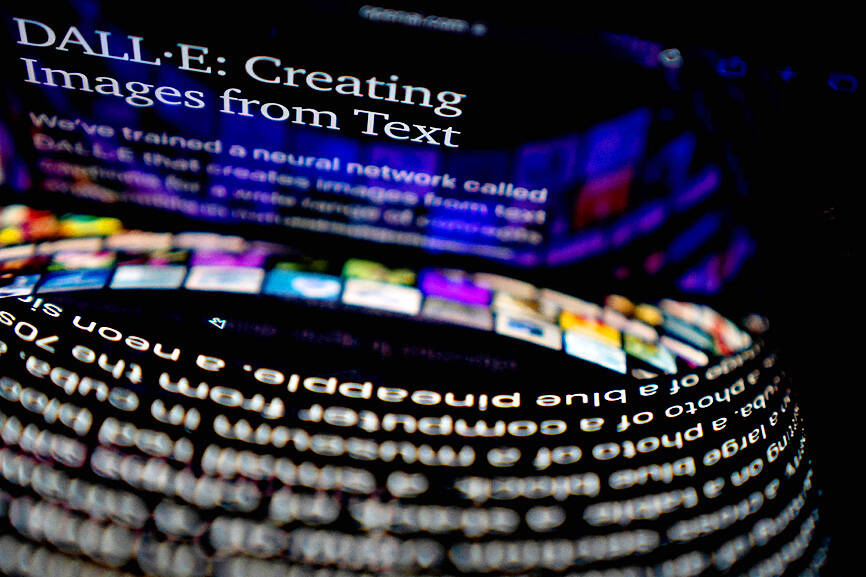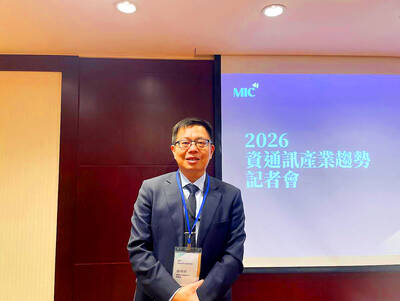California-based start-up OpenAI Inc has released a chatbot capable of answering a variety of questions, but its impressive performance has reopened the debate on the risks linked to artificial intelligence (AI) technologies.
The conversations with ChatGPT, posted on Twitter by fascinated users, show a kind of omniscient machine, capable of explaining scientific concepts and writing scenes for a play, university dissertations or even functional lines of computer code.
“Its answer to the question ‘what to do if someone has a heart attack’ was incredibly clear and relevant,” said Claude de Loupy, head of Syllabs, a French company specialized in automatic text generation.

Photo: AFP
“When you start asking very specific questions, ChatGPT’s response can be off the mark,” but its overall performance remains “really impressive,” with a “high linguistic level,” he said.
OpenAI, cofounded in 2015 in San Francisco by Tesla Inc CEO Elon Musk, who left the AI business in 2018, received US$1 billion from Microsoft Corp in 2019.
The start-up is best known for its automated creation software: GPT-3 for text generation and DALL-E for image generation.
ChatGPT is able to ask its interlocutor for details, and has fewer strange responses than GPT-3, which, in spite of its prowess, sometimes spits out absurd results, De Loupy said.
“A few years ago chatbots had the vocabulary of a dictionary and the memory of a goldfish,” said Sean McGregor, a researcher who runs a database of AI-related incidents.
“Chatbots are getting much better at the ‘history problem,’ where they act in a manner consistent with the history of queries and responses,” McGregor said. “The chatbots have graduated from goldfish status.”
Like other programs relying on deep learning, mimicking neural activity, ChatGPT has one major weakness: “It does not have access to meaning,” De Loupy said.
The software cannot justify its choices, such as explaining why it picked the words that make up its responses.
However, AI technologies that are able to communicate are increasingly able to give an impression of thought.
Researchers at Facebook parent Meta Platforms Inc recently developed a computer program dubbed Cicero, after the Roman statesman.
The software has proven proficient at the board game Diplomacy, which requires negotiation skills.
“If it doesn’t talk like a real person — showing empathy, building relationships and speaking knowledgeably about the game — it won’t find other players willing to work with it,” Meta said in a report.
In October, Character.ai, a start-up founded by former Google engineers, put an experimental chatbot online that can adopt any personality.
Users can create characters based on a brief description and “chat” with a fake Sherlock Holmes, Socrates or former US president Donald Trump.
This level of sophistication fascinates, but also worries some observers, who voice concern these technologies could be misused to trick people by spreading false information or by creating increasingly credible scams.
What does ChatGPT think of these hazards?
“There are potential dangers in building highly sophisticated chatbots, particularly if they are designed to be indistinguishable from humans in their language and behavior,” the chatbot told Agence France-Presse.
Some businesses are putting safeguards in place to avoid abuse of their technologies.
On its welcome page, OpenAI has a disclaimer saying the chatbot “may occasionally generate incorrect information” or “produce harmful instructions or biased content.”

CHIP RACE: Three years of overbroad export controls drove foreign competitors to pursue their own AI chips, and ‘cost US taxpayers billions of dollars,’ Nvidia said China has figured out the US strategy for allowing it to buy Nvidia Corp’s H200s and is rejecting the artificial intelligence (AI) chip in favor of domestically developed semiconductors, White House AI adviser David Sacks said, citing news reports. US President Donald Trump on Monday said that he would allow shipments of Nvidia’s H200 chips to China, part of an administration effort backed by Sacks to challenge Chinese tech champions such as Huawei Technologies Co (華為) by bringing US competition to their home market. On Friday, Sacks signaled that he was uncertain about whether that approach would work. “They’re rejecting our chips,” Sacks

Taiwan’s long-term economic competitiveness will hinge not only on national champions like Taiwan Semiconductor Manufacturing Co. (TSMC, 台積電) but also on the widespread adoption of artificial intelligence (AI) and other emerging technologies, a US-based scholar has said. At a lecture in Taipei on Tuesday, Jeffrey Ding, assistant professor of political science at the George Washington University and author of "Technology and the Rise of Great Powers," argued that historical experience shows that general-purpose technologies (GPTs) — such as electricity, computers and now AI — shape long-term economic advantages through their diffusion across the broader economy. "What really matters is not who pioneers

BUBBLE? Only a handful of companies are seeing rapid revenue growth and higher valuations, and it is not enough to call the AI trend a transformation, an analyst said Artificial intelligence (AI) is entering a more challenging phase next year as companies move beyond experimentation and begin demanding clear financial returns from a technology that has delivered big gains to only a small group of early adopters, PricewaterhouseCoopers (PwC) Taiwan said yesterday. Most organizations have been able to justify AI investments through cost recovery or modest efficiency gains, but few have achieved meaningful revenue growth or long-term competitive advantage, the consultancy said in its 2026 AI Business Predictions report. This growing performance gap is forcing executives to reconsider how AI is deployed across their organizations, it said. “Many companies

COST PRESSURE: Global PC brands such as HP Inc are expected to cope with the situation by either raising prices or downgrading their products, a researcher said Global PC shipments are expected to grow by a mere 0.3 percent to about 180 million units next year, as a surge in memory prices has added cost pressure on manufacturers, the Market Intelligence and Consulting Institute (MIC) said at a news conference in Taipei yesterday. As major memorychip suppliers such as Samsung Electronics Co and Micron Technology Inc shift resources and production capacity toward high-bandwidth memory, which is used primarily in servers and offers higher margins, the supply of low-power DRAM used in PCs and smartphones has been squeezed, tightening supply-demand conditions and pushing up prices, MIC ICT Industry Research